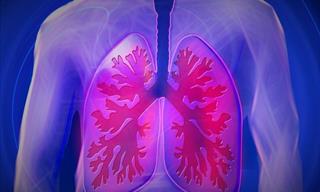We've all experienced a bad cough at some point or another in our lives, but what do you do when your cough simply won't go away? As you're about to find out, a chronic and persistent cough can cause a whole host of health issues, but there's no need to despair just yet, since we've included plenty of useful solutions, too.
Ways a Cough Can Damage You
1. Muscle Pain
Persistent coughing often leads to chronic muscular pain. This is because coughing fits generate a good deal of pressure, which can end up causing pain due to muscle strain.
2. Blood Vessel Damage
When you experience a severe coughing fit, certain fine blood vessels, such as the ones found in the nose or anus, can end up bursting, which may even lead to a hemorrhage.
3. Cracked Ribs
If you can't stop coughing, your rib cage may be in imminent danger, particularly if you are a woman or a pensioner. This is because a chronic cough may cause the middle ribs along the side to become cracked or fractured.
4. Throat Damage
An unyielding cough can cause your throat to get infected, which may then move on to infect other parts of your body. Such coughs can also make the tissues of the throat inflamed, further escalating any existing issues.

5. Diaphragm Rupture
While you're coughing, your diaphragm contracts and retracts. During forced respiratory movements, the ribs are pushed inward and downward while the diaphragm is pushed upward. When the force is too rapid or heavy, a diaphragm rupture may occur.
6. Abdominal Hernia
Although this is quite a rare occurrence, there is still a chance that a chronic cough can cause an abdominal hernia. You are at a higher risk of this happening if you already suffer from chronic bronchitis, and it will require surgical intervention to put right.
7. Coughing Up Blood
If a chronic cough goes on for long enough, there's a chance that you could experience heamoptysis, which is the medical term for coughing up blood. Such blood would usually appear as bright red droplets of blood or as frothy blood-streaked phlegm or saliva. It's very important to visit a doctor immediately if you ever start coughing up blood.
How to Reduce a Cough
If you are finding it hard to get your cough to go away, applying some of the following tips may help:
• Start breathing from your nose only. This will keep both your lungs and the mucus in your throat from drying up and causing irritation.
• Drink plenty of fluids to thin out and moisten any mucus present in your throat.
• Use a humidifier to add some moisture to the air in your home, since dry air can worsen symptoms.
• Stop drinking cow's milk and consuming other dairy products until your cough subsides, since these can make it worse.
• Take regular steamy showers, since they are able to help a cough by loosening nasal secretions.
• Enjoy more hot drinks, since they numb the back of your throat, easing the cough reflex.
If you've adopted the tips above and your cough is still showing no signs of going away, then make sure you speak to a medical professional to guide you further.
Sources: health24, webmd, breathingremedies
Images: depositphotos
 Go to BabaMail
Go to BabaMail




























